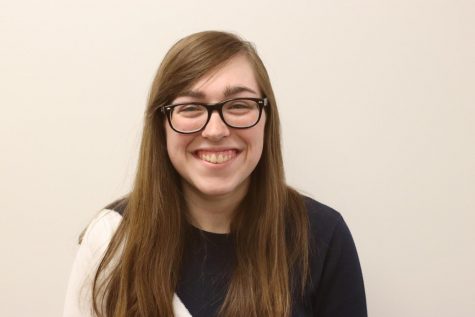Pulitzer Prize winner visits UNI
Feb 8, 2018
UNI’s Kamerick Art Building was packed with people, some of whom ended up sitting on the floor, to see Pulitzer Prize winning journalist Susan Faludi’s lecture on Tuesday, Feb. 6, at 7 p.m.
Faludi’s lecture, titled, “In The Darkroom of Identity and Refuge: A Daughter’s Account,” is the fifth in the Meryl Norton Hearst Lecture Series. Faludi has written multiple books, such as “Backlash,” “The Terror Dream” and “Stiffed.” Her lecture was centered around her most recent book, “In The Darkroom.”
Faludi is an American journalist and feminist. Her story focused on numerous events from her and her family’s past experiences in Hungary. The lecture’s main themes were refuge and identity; Faludi’s great grandparents sought refuge from Nazis taking Jews to concentration camps in 1942.
According to Faludi, her great grandparents died in the camps, but her grandparents and father managed to survive in a cellar with fake Christian IDs.
Faludi talked about how her father, Steven, assumed different roles throughout his life before becoming a transgender woman. From forging a VISA to becoming a stylish photographer, Steven Faludi was constantly changing identities. Eventually, Steven found his true identity, and sent an email to his daughter Faludi explaining that he had undergone a transformation, and was now Stefanie Faludi.
“We live in the age of identity,” Faludi said. “An identity, like refuge, can be what we seek or what we guard.”
Faludi said that she felt that her book was necessary to write, as writing is her way of figuring out her life. According to Faludi, it was because of her alienation with her father during her life that made it easier to break the ice with her father’s interview. She said that her ‘journalistic nature’ helped her get the story.
“And I began to act less like a prosecutor and more as a witness,” Faludi said.
One UNI student in attendance at Faludi’s lecture was criminology major Sami Davis. According to Davis, the lecture was not quite what she was expecting.
“I thought it was very interesting, and it wasn’t what I expected it to be. She talked a lot about the history of Hungary and about her Jewish background,” Davis said. “I have never read any of her books, but this story was one that was personal to her. I wasn’t interested in reading her other books to be honest, but this one was different and something that I am interested in. I might give it a try.”
Faludi shared instances of her father’s domestic abuse towards her family. She recounted one occasion when her father had broken a chair over her mother’s body, and a night when her father dragged her out of bed and beat her head into the floor out of fear for her converting to Christianity. The writing of her father’s story as a book became cathartic for them both.
“My father came around to owning a history that she used to deny,” Faludi said.
Another student who went to hear Faludi’s story was textile and apparel major Brandon Larsen. Larsen said that the way Faludi incorporated her life story was intriguing.
“She tied in prominent concepts that are coming about in society, like the Holocaust and gender identity, and how it ended up being her own dad,” Larsen said.
Larsen said that he heard about the lecture through his ‘Fashion Trends Analysis’ class at UNI.
Charles Williams, a UNI senior majoring in Art History, also came to Faludi’s lecture. According to Williams, Faludi’s speech was well spoken and informative.
“I really liked the political aspect of it and getting to know a bit more about Hungary, because it’s not really a country I would generally know about too well,” Williams said. “Though, it’s nice to know more things about Hungary and the semi-current political context of it and the alienation that people have suffered in there as well as many other refugees.”
Williams said that Faludi’s lecture not only gave him more background information on Hungary and its refugees, but it also inspired him to be more adventurous.
“Her story about her father being super adventurous was inspiring. I personally would like to be more adventurous instead of just being stuck in Iowa forever. In which case, that is why I’m going to Berlin in the summer,” Williams said. “A good rule of thumb is to get a good experience from even the negative things; building off of the negative things and making them more positive rather than just being bogged down.”
Williams said that he liked the way Faludi explained how it is important to be accepting of new things, because some people are, quite literally, in the darkroom when it comes to identity.
At age 86, Faludi’s father agreed to take her to the Synagogue where their family worshipped before the Holocaust.
“We never discussed that violent night when she had beaten my head against the floor,” Faludi said. Sitting in the pews, her father finally opened up to her. And as they exited, her father recited the words of a Jewish blessing for children.
“’May God bless you and guard you. May the light of God shine upon you, and may God be gracious to you. May the presence of God be with you and give you peace.”
“She was giving me refuge,” Faludi said.
–– Campus life editor, Leziga Barikor, contributed to this story.















